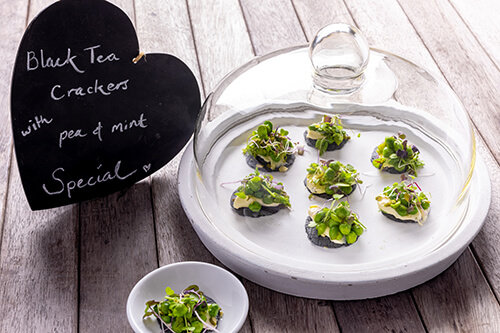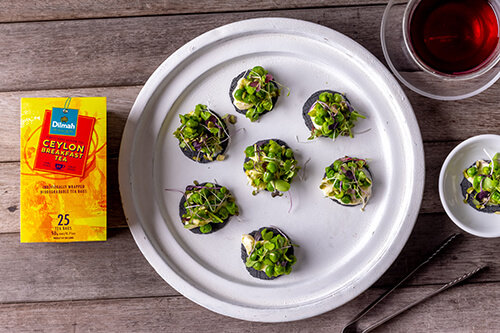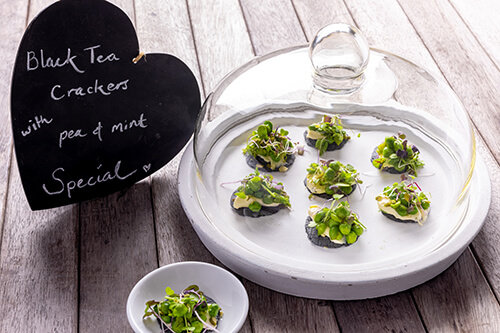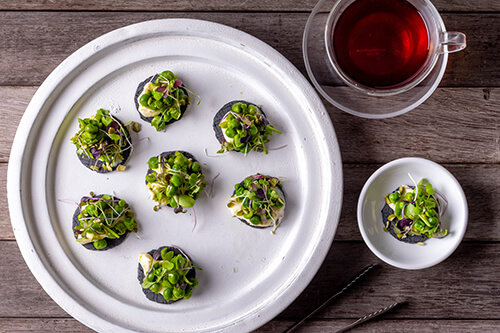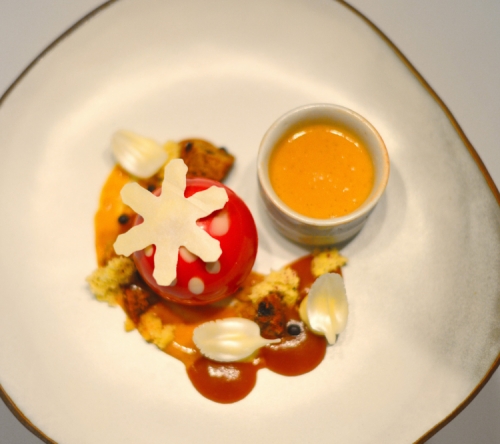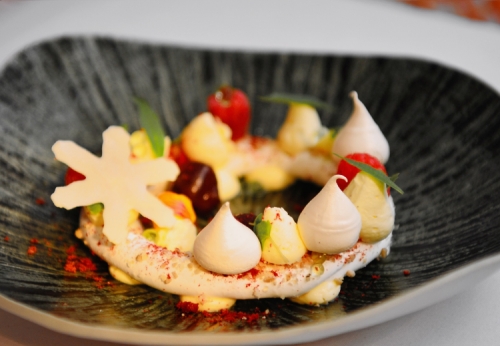Dilmah Activated Charcoal and Ceylon Breakfast Tea Crackers
0 made it | 0 reviews
Peter Kuruvita
- Sub Category Name
Food
Appetisers
Savory
- Recipe Source Name
Gastronomy Recipes
Ingredients
The Poolish*- 1 ½ tsp. activated charcoal (in powder form)
- 100g all-purpose flour
- Pinch of instant yeast
- Pinch of salt
- 100g tepid water
- All of the prepared Poolish* above
- 5 Dilmah Ceylon Breakfast Tea Bags, opened from the top?
- 200g flour
- Pinch of instant yeast
- 1 ½ tsp. salt
- 1 tbsp. honey
- 1 tbsp. blackstrap molasses (optional, see notes)
- 70g olive oil
- 1 tbsp. liquid of choice, like buttermilk / milk / water
Methods and Directions
Poolish- Start by making the poolish 12 hours before the time you are planning to prepare the dough.
- In a medium bowl put the flour, activated charcoal, yeast and salt. Whisk to combine. Add the water and stir with a spoon until just combined.
- It is ok if the mixture looks rough and dry, just try to incorporate any remaining crumbs into the rest of the dough, whilst mixing the least possible.
- Cover with a damp towel and leave at room temperature for 12 hours.
- After 12 hours, you will see a few holes forming on the surface of the poolish. It should also have a distinct, pleasantly sour smell by now. These are indicators that the poolish is ready.
- You should use it within the next two hours; after that it will go stale.
- In a medium bowl put the tea, flour, pinch of yeast and sea salt. Whisk to combine.
- Measure the olive oil in a cup, add the honey, molasses (if using) and liquid of choice, stirring well with a fork to dissolve. Pour this around the edges of the poolish. Using a spoon, gently push inwards the edges of the poolish to release it from the bowl.
- Pour everything (poolish and liquids) into the flour mixture. Begin mixing with a spoon until it comes together to a rough dough; then by hand, until it absorbs all the flour and forms into a dough. If the dough is too dry, add water, 1 tablespoon at a time.
- Dust the counter with flour.
- Turn the dough out onto the counter and knead with your hands for 5 minutes. The dough should gradually start feeling smooth and firm. If it is too dry, wet your hands with cold running water to hydrate it and continue kneading. Repeat wetting your hands, as needed, to create a smooth dough, without dry cracks.
- When the dough is ready, put it in a lightly oiled bowl, cover with a damp towel and leave it to relax for 1 - 2 hours.
- About 45 minutes before baking, preheat the oven to 180°C / 360°F.
- Divide the dough in two.
- Working with a batch at a time, dust the counter lightly with flour and roll it out to 1 cm / 0.5 inches thick with a rolling pin.
- Cut a baking sheet the size of the baking tray and transfer the dough there. Continue rolling it out as thin as possible.
- You may use another piece of baking paper to flip it over and roll. This helps it roll it out very thinly.
- If it extends beyond the edges of the paper, trim it and continue rolling.
- Using a pizza cutter wheel, cut the dough into 4 cm (1.6 inches) squares, or using a cookie cutter cut circles
- Transfer the baking paper along with the crackers to a baking tray.
*Important: bake a batch at a time in the oven. If you bake the two batches together, the crackers won’t be crispy.
- Bake for 12 - 14 minutes in the preheated oven (180°C / 360°F).
- Remove from the oven as soon as they look and feel dry, but not necessarily crispy; for they will become crispy as they cool.
- Leave the crackers on the tray for 5 minutes, then transfer to a wire rack to cool. Then arrange them in a single layer; if they overlap during cooling, they will get soft.
- Repeat with the second batch.
After 10 minutes of cooling on the wire rack, test the crackers for crispness by breaking one in half; it should break with a snap (choose one from the centre of the tray). If it is not, re-bake as for another 5 minutes.
*Poolish is a highly fluid yeast-cultured dough. It’s a type of pre-ferment traditionally used in the production of French bakery products. A Poolish resembles a sponge, for the sponge and dough system. The difference is poolish is fermented much longer and uses a much higher hydration than a plastic sponge - which is why it’s considered the liquid version of a sponge. Typical hydration levels are 100%, with equal weights of flour and water.
Similar Recipes
ALL RIGHTS RESERVED © 2025 Dilmah Recipes| Dilmah Ceylon Tea Company PLC Printed From teainspired.com/dilmah-recipes 24/12/2025
Saved to Favorites

I Made It
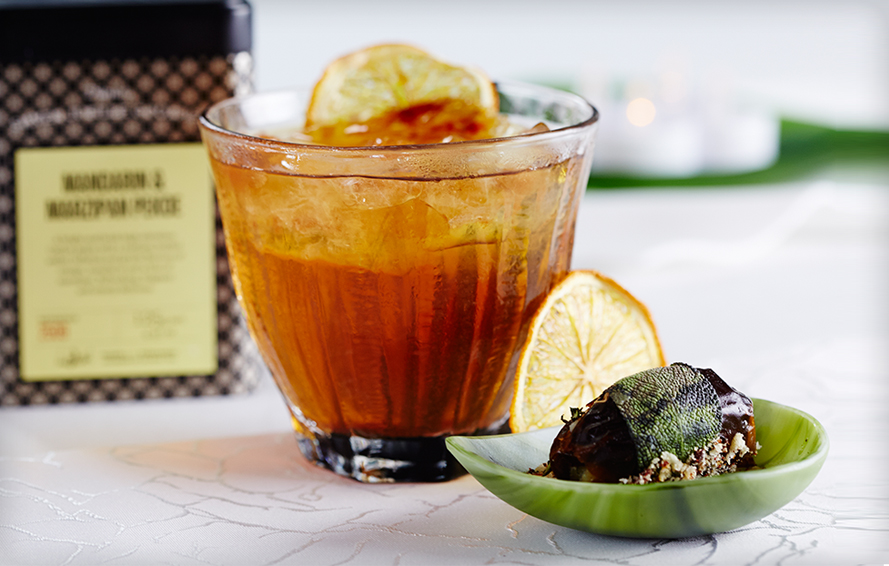
You've made it: times
All cooks:
